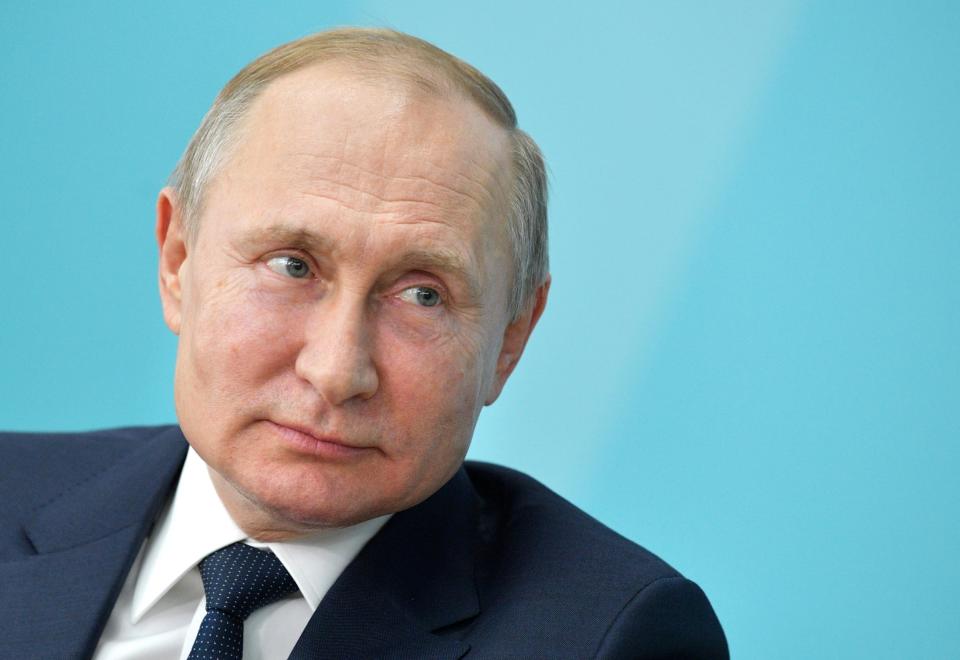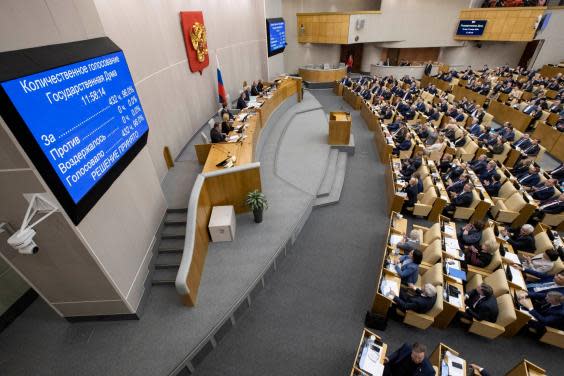Is Putin in a hurry to leave? Russian parliament rushes through constitutional shake-up

Hardly a week has passed since Vladimir Putin used a state of the nation address to announce a radical constitutional shake-up.
In just seven days, government has not only acted upon the presidential suggestions but scribbled them up, submitted them to a hastily-convened “constitutional committee,” and put them before Russia’s parliament.
On Thursday morning, the changes were accepted by the Duma at the first reading, voting in traditionally combative style – 432 in favour, zero against, with zero abstentions.
At first, the proposed constitutional changes appeared to be a thinly disguised attempt by Vladimir Putin to hold on to power beyond his term limit in 2024. But developments since then have complicated such an easy interpretation.
The Kremlin’s haste in drafting and passing the changes – a full four years before Mr Putin’s term is up – have dumbfounded experts. Those who have worked with the Russian president say such speed is out of keeping; Mr Putin has traditionally preferred to keep decisions until the last moment.
The eventual wording of the amendments also brought surprises. In particular, they offered no obvious constitutional short circuit for Mr Putin to exercise formal power outside the presidency. Far from weakening the powers of a successor in favour of parliament or some new body, the changes actually strengthen the role. Any future president will be able to fire constitutional judges, and will also get an extra veto to block parliamentary votes.
So what exactly are Mr Putin’s intentions? And if we assume that he is leaving the presidency, where does he want to end up?
The honest answer is nobody knows. The Russian president has kept his cards close to his chest, and is unlikely to reveal them for some time.
For the time being, his most likely post-2024 destination seems to be a role as head of a beefed-up State Council, a federal body comprised of regional governors which up to now wielded only limited power. At his state of the nation address, Mr Putin suggested strengthening the council further. Many experts surmised that meant it could grow into a committee like the Soviet Politburo, with a broad purview covering most policy areas.
The constitutional amendment passed on Thursday fell roughly in line with such expectations. The State Council’s role was determined as follows: “Ensuring proper functioning and interaction between state bodies, and determining the main directions of domestic, foreign and socio-economic policy.” The exact scope of its powers will become clear in a separate law yet to be published.
But whatever powers the State Council will eventually receive, it has already been made clear that it will remain formally subordinate to the president. Mr Putin has also appeared to rule out the very idea of him carving out a supervisory role above any successor. Speaking on Wednesday, Mr Putin said he did not intend to stay on and “mentor” in the way Singapore’s long-time leader Lee Kuan Yew did in the 1990s.
“In different countries there are different situations, different histories, different cultures,” he said. “In Russia, if you put an institution above the president, it would mean dual power – a fatal situation for a country like ours.”
All of which brings us to a more logical inference of Mr Putin’s constitutional rewrite: that he may, in fact, be paving the way for a genuine successor in 2024. Viewed from this perspective, the complicated constitutional trickery makes much more sense. The changes look to be geared less towards ensuring the continuation of Mr Putin as they are of guaranteeing the survival of Putinism and its ideologies.

“The changes do not limit presidential prerogative in any real way and do not offer an obvious way for Putin to stay on,” says Tatyana Stanovaya, a nonresident scholar at the Carnegie Moscow Centre. “What they do is strengthen the authority of the centre, as well as creating a transitory period in which Putin can observe a chosen successor from afar.”
Wherever he ends up in 2024, Mr Putin will retain hold of three important levers of informal power, the expert says. He will remain the most popular politician in the land. He will be able to exercise power via United Russia, the ruling party he set up (and is likely to head). And he can act via the hundreds of people he appointed to high office.
In today’s Russia, such levers count for an awful lot. “It should be enough for him to remove a successor and try another one if he thinks it is necessary,” Ms Stanovaya says.
Social media has been awash with possible theories as to why the president is acting in such a rush. Is he ill? Is he spooked by falling popularity? Is he acting on the advice of a psychic who advised him it was now or never? Or, more bizarrely: is there a lady, a Meghan Markle type, dragging him from the limelight?
Political analyst Konstantin Kalachyov suggests Mr Putin’s haste is most likely provoked by a “combination” of factors.
“We obviously cannot discount the idea that Mr Putin has a diagnosis of some kind, one that may not have a clear expiry date,” the analyst says. “At the same time, he’s already made it clear that he does not want to go down in history as a bumbling old Brezhnev-type figure. He understands it’s better to arrange these things while there is time and opportunity to do so.”
The Russian president seems to be using the moment to ensure that a successor doesn’t change course.
“All the amendments are about extending the life of Putinism. The central idea of national independence. The exclusion of external influence. The continuation of statism and a conservative ideology,” Kalachyov says.
“The one thing Putin doesn’t want is a repeat of what he did to Yeltsin – which was to rip up an entire legacy.”
Read more
Russia looks to prospect of future without Vladimir Putin

 Yahoo News
Yahoo News 